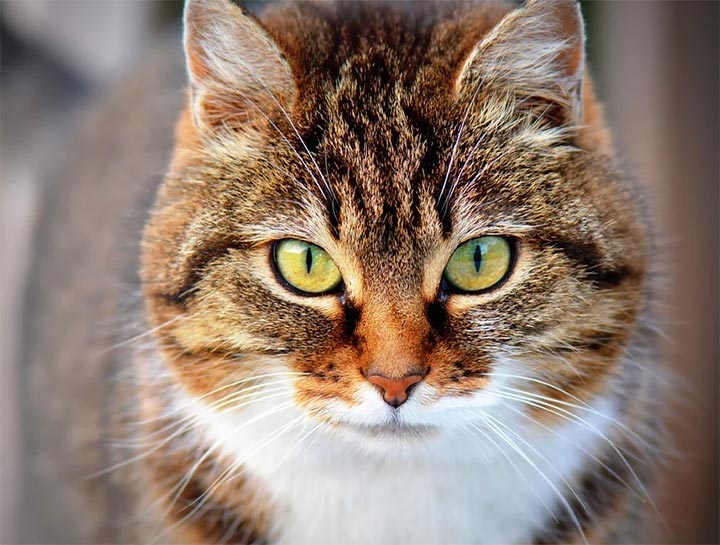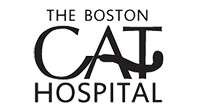Management of Feline Hyperthyroidism

Hyperthyroidism is a common disorder of middle-aged and older cats. The thyroid gland is usually enlarged in a benign (non-cancerous) manner, and often can be palpated during the physical exam. As a result of excessive production of thyroid hormone, potentially serious disorders can develop in your cat's cardiovascular system, liver and intestinal tract. Common symptoms your cat may exhibit are weight loss, increased appetite, increased water consumption, and occasionally vomiting and or diarrhea. Hyperthyroidism can be diagnosed with a blood test checking the thyroid hormone level.
There are four therapeutic options to manage hyperthyroidism:
- Methimazole, a drug that reduces the output of hormone by the thyroid gland, is usually effective in correcting the hyperthyroid condition. It is given twice daily, but it can harbor some side effects that could be serious. These include reduced numbers of white blood cells and platelets, and anemia. White blood cells are important to the immune system; platelets are essential to the blood clotting process. An itchy skin rash, poor appetite and nausea have occasionally occured in cats taking Methimazole. However, most cats tolerate the medication very well and show marked improvement in their overall condition. Methimazole is easily given to cats by way of either a flavored chewable treat (chicken, liver, tuna or beef flavor), a transdermal gel applied to the ear, or a small scored tablet given in food or a "pill pocket". Because of the variety of forms available, owners of hyperthyroid cats rarely have difficulty administering Methimazole.
- Radioisotope Therapy (I 131), This treatment has been proven to be very safe and effective. The cat is given one injection of radioactive iodine. This drug selectively inactivates the overactive thyroid cells, while not affecting any normal thyroid cells. At The Boston Cat Hospital we highly recommend this procedure for qualified cats. If you are interested in further information on radioisotope therapy, please contact one of the following centers accredited for this treatment:
Angell Animal Medical Center
Jamaica Plain, MA (617) 522-7282
Feline Thyroid Treatment Center at VCA
Montgomery Road Hospital, Westfield, MA (888) 228-4131
When you call, be sure to inquire about the cost of treatment, any recheck appointments necessary, the duration of the stay and any special requirements for home care following treatment. Please remember that there usually is a waiting list for this procedure. Thus, most cats will start Methimazole while waiting for radioisotope treatment. Methimazole is discontinued 10 to 14 days before admission for therapy. Medications are usually unnecessary upon completion of treatment, however occasionally, cats with subclinical kidney disease, may have their kidney disease exacerbated by the I 131 treatment. These cats may require thyroid supplementation to improve their kidney function.
- Surgical removal of the thyroid gland. Serious risks can be associated with surgical treatment. First, anesthesia can be risky for a hyperthyroid cat because they are often older, and may have cardiac dysfunction due to the hyperthyroid state. Second, disturbance or removal of the nearby parathyroid glands can result in post-operative low blood calcium levels. Although temporary, this condition can be very serious and even life threatening. Third, although all thyroid tissue should be removed during the surgery, in some cases small pieces of thyroid tissue may be located in other areas of the cat's body. This "ectopic" tissue can become overactive in months to years post surgery, resulting in recurrence of the hyperthyroid state. Fourth, since all the thyroid tissue is removed, thyroid supplements will frequently be required daily for the rest of the cat's life.
- Hill's Prescription Diet y/d. Recently a prescription diet for controlling hyperthyroidism has become available. It is a low iodine diet that results in normalization of serum thyroid levels. Without iodine, the thyroid gland cannot produce thyroid hormone. y/d does not cure hyperthyroidism, but offers control of the disease. In order for the diet to be effective, y/d must be eaten exclusively i.e. no other cat food, treats, human food, chewable medication, or pill pockets can be fed to your cat. y/d is available in both dry and canned forms and is safe to feed all the cats in your household. Several cats at The Boston Cat Hospital have had their hyperthyroidism controlled with the y/d diet. Although the prescription diet is more expensive than regular cat food, the side effects of the three other treatments are eliminated. In addition the number and cost of recheck visits are also reduced.
With any of the above treatments, some hyperthyroid cats can have reduced kidney function, which can worsen after correcting the hyperthyroid state. In rare cases, this cannot be detected until after the thyroid disease is treated. Because of the delicate balance between kidney function and thyroid function, your cat's kidney and thyroid function should be monitored at least every 4-6 months.
At the Boston Cat Hospital, it has been our experience that most hyperthyroid cats when treated can live long, healthy lives. If you have further questions about this condition, please ask us at the next office visit or contact us at (617) 266-7877.
